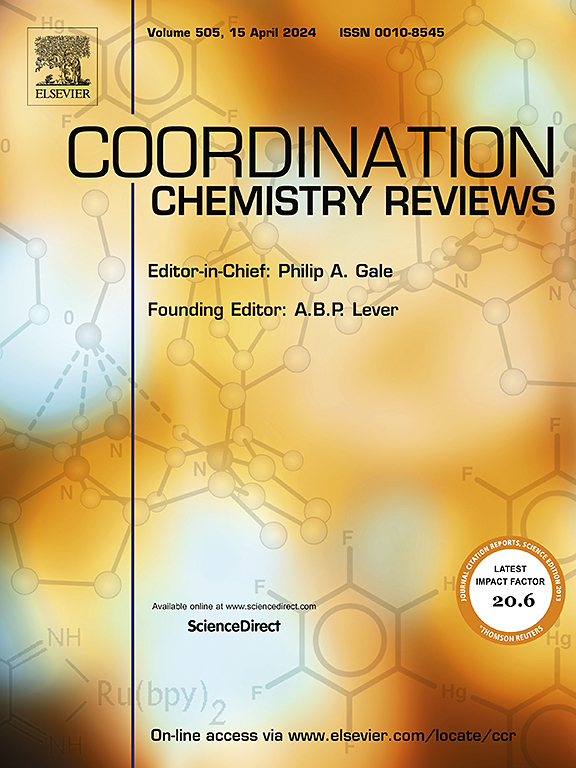Porphyrins-based multidimensional nanomaterials: Structural design, modification and applications
IF 20.3
1区 化学
Q1 CHEMISTRY, INORGANIC & NUCLEAR
引用次数: 0
Abstract
As global demand for renewable energy consumption and environmental treatment intensifies, the development of innovative technologies and green materials for catalytic transformation is increasingly critical. Porphyrins, often referred to as the ‘pigments of life’, are notable for their macrocyclic π-conjugated electronic structures and distinctive light excitation/absorption properties. They have been widely used for oxygen transport, photosynthesis, as well as serving enzymatic catalytic centers in biological processes. However, the inherent strong π–π interactions among rigid porphyrin molecules lead to disordered stacking and self-aggregation, diminishing the accessibility of active sites and the efficiency of charge transfer during practical applications. Hybrid porphyrins with multidimensional nano-substrates, like graphene, metal oxide, et al. is a promising strategy that can not only mitigate self-aggregation of porphyrins but also can achieve a synergetic enhancement effect. Selecting suitable substrates and effective bonding interactions between the porphyrins and substrates are critical for achieving the desired performance in specific applications. This review comprehensively summarizes recent advances in porphyrin-based multidimensional nanomaterials (PMNs), focusing on the influence of nanoscale effects, performance enhancements, and their applications in energy conversion, storage, biomedicine, and environmental protection. It delves deeply into the role of interaction forces in boosting interfacial electron transfer for superior catalytic transformations. Additionally, it critically examines the correlations between the high loading and dispersion of porphyrin molecules, emphasizing strategies, structural design, nanoscale effects, and interfacial interactions. Notably, the discussion extends to the mechanistic links between the structure, properties, and applications of PMNs. The review concludes by addressing the critical challenges and future directions in this field.
基于卟啉的多维纳米材料:结构设计、改性和应用
随着全球对可再生能源消费和环境治理需求的增加,开发用于催化转化的创新技术和绿色材料变得越来越重要。卟啉通常被称为 "生命颜料",其显著特征是具有大环π共轭电子结构和独特的光激发/吸收特性。它们被广泛用于氧气运输、光合作用以及生物过程中的酶催化中心。然而,刚性卟啉分子之间固有的强π-π相互作用会导致无序堆叠和自聚集,从而在实际应用中降低活性位点的可及性和电荷转移的效率。卟啉与多维纳米基底(如石墨烯、金属氧化物等)的混合是一种很有前景的策略,不仅能缓解卟啉的自聚集,还能实现协同增强效应。选择合适的基底以及卟啉与基底之间有效的键合相互作用是在特定应用中实现理想性能的关键。本综述全面总结了卟啉基多维纳米材料(PMNs)的最新进展,重点关注纳米级效应的影响、性能增强及其在能量转换、存储、生物医学和环境保护中的应用。该书深入探讨了相互作用力在促进界面电子转移以实现卓越催化转化方面的作用。此外,它还批判性地研究了卟啉分子的高负载和分散之间的相关性,强调了策略、结构设计、纳米级效应和界面相互作用。值得注意的是,讨论延伸到了 PMNs 的结构、特性和应用之间的机理联系。综述最后讨论了这一领域的关键挑战和未来方向。
本文章由计算机程序翻译,如有差异,请以英文原文为准。
求助全文
约1分钟内获得全文
求助全文
来源期刊

Coordination Chemistry Reviews
化学-无机化学与核化学
CiteScore
34.30
自引率
5.30%
发文量
457
审稿时长
54 days
期刊介绍:
Coordination Chemistry Reviews offers rapid publication of review articles on current and significant topics in coordination chemistry, encompassing organometallic, supramolecular, theoretical, and bioinorganic chemistry. It also covers catalysis, materials chemistry, and metal-organic frameworks from a coordination chemistry perspective. Reviews summarize recent developments or discuss specific techniques, welcoming contributions from both established and emerging researchers.
The journal releases special issues on timely subjects, including those featuring contributions from specific regions or conferences. Occasional full-length book articles are also featured. Additionally, special volumes cover annual reviews of main group chemistry, transition metal group chemistry, and organometallic chemistry. These comprehensive reviews are vital resources for those engaged in coordination chemistry, further establishing Coordination Chemistry Reviews as a hub for insightful surveys in inorganic and physical inorganic chemistry.
 求助内容:
求助内容: 应助结果提醒方式:
应助结果提醒方式:


